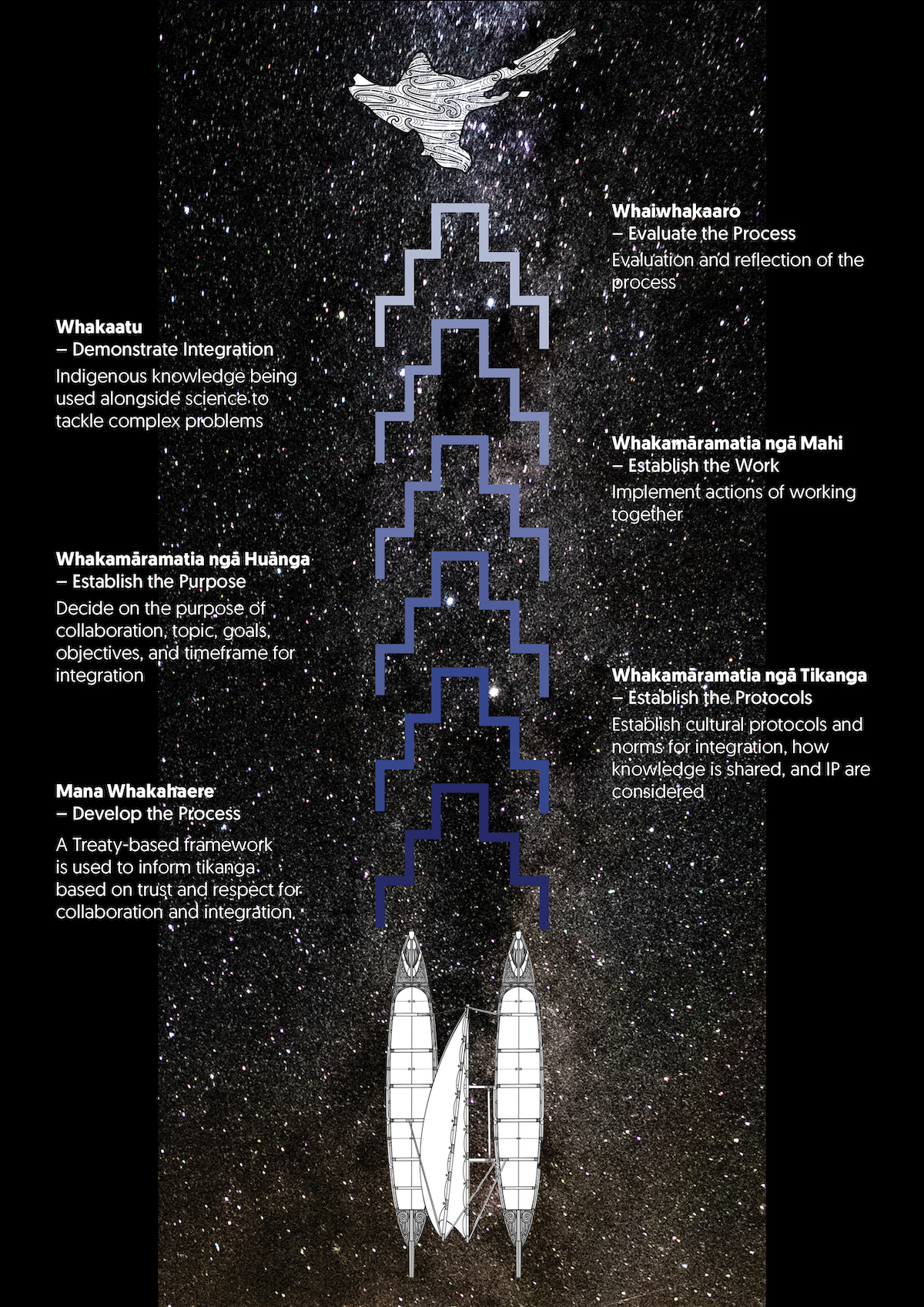Te Haerenga Pāhekoheko
A Kaupapa Māori approach for integration and transdisciplinary research.
Objective: Produce an indigenous integrative research model and framework to address complex issues and questions and provide guidance for integration.

Te Haerenga Pāhekoheko – Kaupapa Māori framework and model for integration and transdisciplinary research
Summary: This framework has been contextualized within the paradigm of Te Haerenga Pāhekoheko (the collaborative journey). The waka hourua (double-hulled waka) in this respect symbolises the indigenous and non-indigenous elements of the relationship/partnership, working together towards a common goal (te whāinga), which in this case is achieving integration and transdisciplinarity – symbolised as the motu (island). Ngā ara poutama (the stages/steps) represent the steps being taken by both knowledge systems to acknowledge the appropriate (tika) way of making progress to ensure integration at all levels. The ara poutama are also an effective tool for researchers to use as a template for assessing transdisciplinarity and integration (see Te Reo o Te Repo; Ngā Whāinga Kaitiaki o Waiapu). Ngā rāwhara (the sails) represent the values (ngā whanonga pono) that are reinforced in-between the waka hourua, to navigate us to the destination. Ngā whetū (the stars) offer us reflection along the way, and so that we look back and reflect once at te mutunga (the end) to evaluate our success at integration.
See the Te Haerenga Pāhekoheko guide for more details. (PDF)
Ngā Ara Poutama / Stages of the Process
1. Mana Whakahaere / Develop the Process
Develop a framework under Te Tiriti o Waitangi and form tikanga based trust and respect for collaboration and integration.
2. Whakamāramatia ngā Tikanga / Establish the Protocols
Establish cultural protocols and norms for integration, how knowledge is shared and IP are considered here.
3. Whakamāramatia ngā Huānga / Establish the Purpose
Decide on the purpose of collaboration, topic, goals, objectives, and timeframe for integration.
4. Whakamāramatia ngā Mahi / Establish the Work
Implement actions of working together.
5. Whakaatu / Demonstrate Integration
Demonstrate Indigenous knowledge being used alongside the science to tackle complex challenges or problems.
6. Whaiwhakaaro / Evaluate the Process
Evaluation and reflection of the process.
Ngā Whanonga Pono / Values
Āta — The Principle of Growing Respectful Relationships
Āta acts as a guide to understanding the relationships and well-being when engaging with Māori. It focuses on our relationships, negotiating boundaries, and working to create and hold a safe space with corresponding behaviours.
Āwhinatanga — The Principle of Care and Support
Āwhina means care, support, help, stewardship, and assistance. It embraces the team and respects the expertise, competencies, knowledge, and perspectives individuals provide.
Kaupapa – The Principle of Collective Philosophy
Kaupapa refers to the collective vision, aspiration, and purpose of research. Integration must be based on kaupapa and have a clear understanding of what is to be achieved. It also refers to the aspirations of iwi/hapū/whānau and community.
Mātauranga Māori - The Principle of Māori Knowledge
Mātauranga Māori within an integrative model is recognised as a dominant knowledge system and perspective. Includes Te Reo and tikanga Māori.
Pāhekoheko - The Principle of Integration
Pāhekoheko refers to integration, cooperation, and interaction from a Māori perspective that drives interconnections and interdependencies across knowledge forms and disciplines.
Te Ao Māori - The Principle of a Māori worldview
Te Ao Māori is a (w)holistic perspective based on knowledge(s) consistent with kaupapa Māori.
Te Titiri o Waitangi – The Principle of the Treaty of Waitangi
The principle of the Treaty of Waitangi refers to working under a Treaty model of participation and partnership. This ensures trust and respect in the relationship towards integration.
Tikanga – Customary protocols
Tikanga refers to following correct cultural or customary protocols, process, and rules in the relationship. Tikanga ensures correct process and steps are followed from the onset to the end of a project.
Report: Taura Y, Harmsworth G, Wareka M 2021. Towards a Māori transdisciplinary framework and model for integration. Contract Report: LC3930. Hamilton, Manaaki Whenua – Landcare Research.
Portfolio: Society, Culture & Policy
Project: SSIF Māori Flagship – Towards a Māori integration framework for Aotearoa New Zealand
Project Leaders: Yvonne Taura, Kairangahau Māori and Garth Harmsworth, Toi Rangahau Māori
